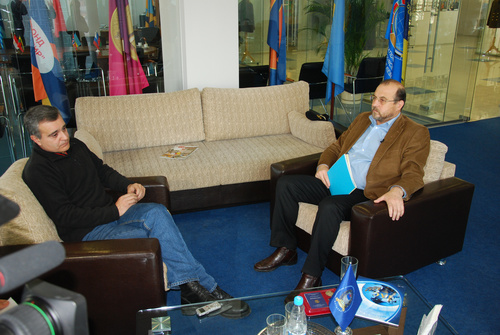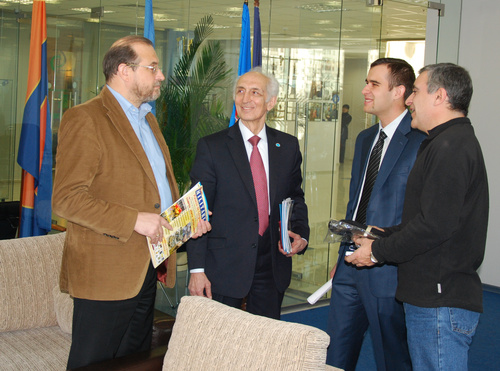29 May 2022
Congratulations to Mr. L. Attar-Bayrou with International Day of UN Peacekeepers
30 January 2012
On 30 January, 2012, at the headquarters of the IAC the Chairman of the International Advisory Council of organizations of reserve officers (IAC), head of the National Association of Unions of the Armed Forces Reserve Officers (MEGAPIR) Alexander Kanshin had a meeting with an editor of a Spanish military journal «ХХI Legion» Juan Antonio Aguilara Santilana.
During the meeting, which was arranged at the request of the Spanish party, Alexander Kanshin gave an interview to the guest from Madrid. Below we present it to our viewers.

— The idea of creating such a Council did not appear at once and from nowhere, but it had been growing in the National Association of Unions of the Armed Forces Reserve Officers (MEGAPIR) since long ago. During numerous trips abroad, receiving foreign delegations we got sure that reserve officers from different countries share common points of view, interests, moral and ethical standards and patriotic values.
Taking into account the intention of reserve officers to communicate and exchange experience, develop «people’s diplomacy», in 2010 the Board of Directors of Association «MEGAPIR» decided to propose to reserve officers’ organizations from different countries to create a mechanism and arrange interaction within its own international structure, which finally became International Advisory Council.
Before this we have generalized the experience of the Association «MEGAPIR» in conducting a number of big events in Europe, Asia, Africa and America, we have analyzed bilateral and multilateral meetings with our colleagues and results of scientific and practical conferences in London, Washington, Oslo, Alexandria and Bratislava. All this confirmed the possibility and importance of developing contacts among reserve officers from different countries. It became evident, that they face almost the same problems after their termination of active duty or retirement (inscription into reserve), that is why organizations of reserve officers deal with solving them using the same means and methods. If so, then coordination of efforts may have positive influence on the efficiency of activities of these organizations.
Finally, the idea of creating IAC, proposed by «MEGAPIR», was supported by organizations of a number of countries of the CIS, the Baltic region and Central Europe. For fulfilling preparation duties, there was established a Steering Committee on the creation of IAC, the first meeting of which took place in Moscow on 18 March, 2011. The meeting was attended by members of the Steering Committee — representatives of Azerbaijan, Armenia, Byelorussia, Kazakhstan, Kirghizia, Latvia, Lithuania, Russia, Slovakia, Tajikistan, Ukraine, Estonia, and also representatives of Norway as observers. The meeting concluded with signing the Protocol on the creation of the IAC, approving the Conception of its establishment and activities and also deciding to conduct the first IAC meeting in Moscow on 15 June, 2011.
So, in June the principal directions of the work of the Council and the final statement of participants were adopted. There were elected the Chairman and three
— The principal goal of the IAC is spiritual and intellectual cooperation among organizations of reserve officers in the interests of realizing different projects and performing joint events. Members of the Council contribute to the propaganda of healthy life among young people, their involvement in physical training and sport, and also assist in conducting joint solemn events, dedicated to anniversaries and official holidays of member states, exchange printed and electronic materials. We also support building in the public opinion a friendly and charitable attitude towards veterans, disabled people, military pensioners based on principles of spirituality and compassion. We stand for the exchange of work experience in the field of assistance to moral and ethical education of children and youth, improvement of the image of the armed forces and service in the army. In the course of countering the current challenges and threats, IAC is dedicated to strengthening friendship and cooperation, mutual assistance and mutual understanding, based on spiritual solidarity of the reserve officers. members of the Council are aimed at searching ways and methods of interaction, directed at the formation among young people principles of justice, mutual respect and friendship, strengthening cultural, intellectual and business relations among countries by means of «people’s diplomacy» during mutual visits, scientific and practical conferences, disputes,
At the same time, it is necessary to mention that the IAC does not follow any political objectives; its activity cannot involve any kind of interference in the internal affairs of other organizations and countries. Members of the Council are obliged to carry out joint activities in compliance with legislation of their countries, as well as international treaties and activities. Decisions of the Council are made based on consensus and have form of recommendations. We work in cooperation with state bodies, but have completely determined status of independency,
— Currently IAC is composed of 18 organizations from 16 countries, the overall leadership is performed the Chairman of the Council and three
The IAC is a democratic and voluntarily created formation, not burdened by cumbersome statutes and rigid financial obligations. The rights and responsibilities of the Council are derived from the powers that determine its member organizations. When making decisions at IAC meetings, each delegation, regardless of the number of its members, has one vote. In meeting and other events, held by the Council, interested organizations of reserve officers may participate as observers. In this case, suggestions and recommendations made by the delegations of these organizations are taken into account when members of the Council make decisions.
— The main result is that we have started our real practical work, which is becoming more and more
At the same time we do not intend to make much advertisement of ourselves, to declare some
— We are interested in cooperation within IAC with organizations, which have different age and character of activities, represent various countries and armed forces with different traditions and experience. This is why IAC Executive Secretariat continues its work on the enlargement of the range of participants of the Council. However, this does not mean that our goal is to achieve its unlimited expansion or nominal participation in our work.
At the moment large amount of work is being done to prepare for the second meeting of the IAC, which will be held in Bratislava. By this event we will have generalized the proposals of Council participants, including members of Spanish Reserve Association and Spanish Military Association, as well as all readers of your journal.
— If you mean financial assistance, we do not get any financial assistance from anyone. IAC is an independent and

— You represented the Spanish Reserve Association at the first IAC meeting in June and you saw with your own eyes with what sincere desire and pleasure reserve officers meet and communicate. They dedicated many years of their lives to defending their countries, that’s why they can understand better than anyone the values of peace and friendship. I am sure that members of Spanish Reserve Association will only benefit, in the very broad sense, from active participation in the work of the IAC. It’s very important for us to maintain friendly ties with colleagues from other countries, to educate children and grandchildren in the spirit of good neighborliness and peace. Now officers from different countries, with different political regimes, different religious views, and even from different former alliances have received a fine opportunity to meet within the framework of the IAC, communicate and arrange joint events.